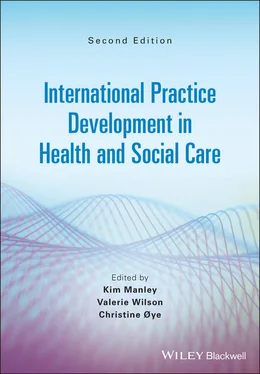Practice development: its relevance to contemporary health and social care and crisis
PD is about our individual and collective practice as health and social care practitioners in any setting. Our purpose based on what matters to people has at its heart relationships with individuals, people and communities based on a shared set of values and visions about how we work together and with those experiencing care.
However, most health and social care is provided in teams and increasingly across complex systems, where workplace culture and contexts are recognised as powerful influencers on how care is experienced by both recipients and providers. Social norms reflect the values considered to be important (either implicitly or explicitly) and through the culture experienced impact how we work and learn together.
Workplace culture influences whether assumptions are challenged, learning and shared goals are implemented, aspirations are fulfilled, and subsequently whether valued staff are retained and health outcomes achieved.
Prerequisites to achieving good workplace cultures include leadership and facilitation expertise anchored in the values that enable collective approaches built on shared direction and purpose. These prerequisites are integral to PD and for this reason, a collaborative PD journey often begins by exploring and agreeing key values ‘up front’ .
A growing evidence base through PD research together with a commitment to knowledge translation has helped us to understand not just what strategies work, why they work and for whom they work (Wilson and McCormack 2006), but also how to engage people and how to embed and sustain learning and evaluation in the workplace (Dewing 2010).
The knowledge base derived from practice‐based research with people in different contexts is particularly important as frontline practitioners across all settings (individual homes, care homes, communities and hospitals) are risking their lives in relation to COVID‐19 to provide care that is not just safe but that courageously keeps people at the heart of care, both recipients and team colleagues.
The pandemic has tested the key values and person‐centred approaches championed and facilitated through PD about how we communicate. The use of protective clothing inevitably dehumanises our humanness through detracting from showing that the person we are communicating with is a unique person. Because of muffled verbal and non‐verbal communication, the message that the person is at the heart of our purpose can be lost. We have all been heartened by the innovative ways and sheer persistence in overcoming these physical barriers when committed to human values by those who care. This recognises the tremendous burden on practitioners and carers and the need for practitioners to be supported and treated in a person‐centred way too.
The notable cohesion and interprofessional teamwork that have resulted from a shared purpose and direction during the pandemic have also required total community collaboration. Powerful impact is demonstrated when people genuinely work together, breaking down the professional silos and barriers that often hinder effective collaboration.
Teams which have already learned to work together with shared values and visions will be more prepared for crisis situations, such as COVID‐19, to find effective person‐centred ways of working despite challenges experienced and ‘top‐down’ instructions. Practice developers in teams work with contextual barriers to find promising ways despite challenges, by co‐creating ways of working for innovative solutions.
The pandemic has generated a crisis in how we work together. PD theory draws on the work of Bryan Fay (1987) to understand the nature of crisis informed through critical social science to explain how such challenges can lead to creative innovations that inform both future systems and ways of working. Fay’s theory itself has been revised to capture the creativity generated through PD research (McCormack and Titchen 2006).
Creativity in response to crisis has already resulted in dramatic increases in virtual ways of working and communication supported by technology. With family members not able to be at the bedside of seriously ill relatives, technology has connected people to those important to them. Telemedicine is replacing the resource‐intensive provision of outpatient follow‐up clinics; previously perceived barriers are being recognised as assumptions, enabling them to be dismantled to free up more people‐orientated ways of working. Different teams and partners are connecting virtually to enable prompt decision‐making and action, with seismic shifts in genuine interprofessional working and learning. COVID‐19 has freed us from the taken‐for‐granted assumptions around innovations, to cut through red tape and implement new policies, procedures and practices.
It is timely to recognise in this pandemic year that it is also the year of the nurse and midwife, and that nursing has upheld the values of person‐centred, compassionate care and safety over the past century. This has particularly come to the fore in the current crisis, where it has been recognised widely and publicly that these values are important to society.
Practice development: growing scope and impact from interprofessional collaboration and working with shared values
PD as a formal methodology has been driven by nursing and midwifery across all its specialisms, but is increasingly embraced by other health and social care professionals. One of the eight revised principles of PD emphasises its increasing relevance to all:
PD is fundamentally about person‐centred practice that promotes safe and effective workplace culture where all can flourish .
Chapter 8discusses this principle together with seven others underpinning PD methodology.
This edition of the book marks a groundswell of involvement in PD, with many other professions globally experiencing its relevance. The International Practice Development Journal , a peer‐review publication launched in 2011, has been instrumental in championing the uptake of PD concepts by different professional groups, further enabling interprofessional practice, and also disseminating its growing evidence base.
Contributions have embraced interdisciplinary and medical leadership programmes to support transformation (Akhtar et al. 2016), physiotherapists using person‐centred frameworks when caring for people with long‐term conditions (Dukhu et al. 2018), a biomedical scientist focusing on their own learning (Jackson 2013), an obstetrician and maternity team preparing for maternity transformation (Crowe and Manley 2019), a United Church minister reflecting on learning about self (Eldridge 2011), a physiotherapist reflecting on transformative learning (Owen 2016), an anaesthetist reflecting on transforming self as a leader (Adegoke 2017), an intensivist exploring the relevance of PD to quality improvement (Lavery 2016), allied health professionals drawing on PD principles (Bradd et al. 2017), therapists supporting mental health and family wellbeing (Karlsson et al. 2013), and social workers in the care of older people (Cronqvist and Sundh 2013).
Interprofessional practice is a much stronger focus of publications, with the journal publishing special issues from a range of professions that critically examine concepts relevant for the tradition of PD, for example a Special Issue on Person, Care and Aging (Øye et al. 2020).
Whilst PD has become more interprofessional, it has also experienced expansion on other fronts endorsed by its growing theoretical insights and research, with increasing numbers of postgraduate students undertaking research into PD and person‐centred practice, applied to a changing world. For example, PD has influenced system‐wide approaches, providing the foundation for 1) the state‐wide Essentials of Care programme across New South Wales, now embedded in practice (NSW 2014), and 2) state strategy for education and training (see Chapter 14). In the UK, PD methodology combined with action‐orientated research approaches and realist evaluation (with which it has a strong affinity) has informed systems thinking for workforce transformation and systems leadership (Manley et al. 2016; Manley and Jackson 2020), insights into the development of safety culture (Manley et al. 2019), and multiprofessional continuous professional development (Manley et al. 2018).
Читать дальше












